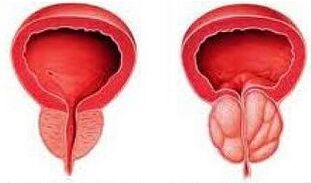Chronic prostatitis is a long -term inflammation of the prostate gland, while the symptoms are often absent, which is why most of the male population is not aware of the disease.

The development of a chronic form of prostatitis is a consequence of an acute process, although in practice this is rather rare.As a rule, chronic inflammatory prostatitis gradually begins, without unpleasant symptoms and sensations, often the course of the disease is found in the patient by chance, when examining an ultrasound.
Both young and medium and old people are subject to chronic form.Prostatitis also threatens those who lead an inactive lifestyle from the family of their activities, feel excessive physical effort on the horse and observe sexual abstinence.
Classification
According to the modern classification of prostatitis, developed in 1995, different categories of the disease are distinguished:
- Acute bacterial prostatitis (OBP) is the most common type of prostatitis.It is usually caused by a bacterial infection and is easily diagnosed due to typical signs.Acute bacterial prostatitis can occur at any age.Symptoms include painful urination, inability to completely empty the bladder, pain in the area of the lower abdomen, back or pelvic.There may be a fever accompanied by creepy.
- Chronic bacterial prostatitis is a disease with typical symptoms of chronic inflammation and a greater amount of bacteria and leukocytes in the urine and the secret of the prostate after its massage.
- Chronic prostatitis (CP) is the most common form of prostatitis.In most cases, it is a consequence of acute bacterial prostatitis (not treated or not very treated).If there are symptoms, they occur in the form of pain in the genitals or in the pelvic area, difficulty during urination or painful urination and ejaculation.
- Asymptomatic inflammatory prostatitis - with this form of disease, the classic symptoms of prostatitis are absent and the disease itself is detected by chance, when you contact the clinic for a different reason.

In the presence of an infectious component, indicate a chronic bacterial prostatitis.(infectious);In the absence of microbial pathogens -non -kiss (non -infectious) prostatitis prostatitis.It is believed that in 90-95% of all cases chronic non-bacterial prostatitis occur and only in 10-5% -batterico.
Reasons
The occurrence of chronic prostatitis can contribute to a series of factors.First of all, this is:
- IPP: Chlamydia, Ureaplasma, Micoplasma, Herpes viruses, Cytomegalovirus, Tricomonades, Gonococcus, Genudo Ado, E. Coli (Escherichia coli) can influence the urethra and detect prosta in the tissues;
- violation of blood circulation in the pelvic organs (stagnation in the prostate leads to its inflammation);of sedentary life (drivers, office employees, officials);
- prolonged sexual abstinence interrupted by sexual intercourse or artificial elongation of sexual intercourse;
- Regular hypothermia (lovers of extreme relaxation: diving, surfing and skiing);
- stress: mental and physical overload.
- For the development of chronic prostatitis, not so much the presence and activity of the pathogenicMicroorganisms is as important as the condition of the pelvis and the blood circulation in them, the presence of concomitant diseases and the level of protective mechanisms.
Symptoms of chronic prostatitis
Very often, with the development of a chronic form of prostatitis, the symptoms practically without disturbing a man.In this case, all the signs of acute prostatitis will not manifest or will show themselves to a much smaller extent.
The most common symptoms of chronic prostatitis in men are:
periodic pains and unpleasant sensations in the perineum;
- unpleasant sensations in defecation and urination;
- irradiation in the anus, thigh, testicles;
- discharge from the urethra.Bright, they can be so insignificant that patients with chronic prostatitis do not pay much attention to them.
- Exacerbation of chronic prostatitis
The exacerbation of the disease, as a rule, accompanies the following symptoms:
pain and burning in the urethra;
frequent impulse to the urinary process;
- pain in the lower abdomen, perineum and right;
- dolore nell'addome inferiore, perineo e retto;
- Signs of decreased men of sexual activity;
- pain during the defecation act.

According to some doctors, the psychological symptoms of chronic prostatitis can also be distinct, which include increase in irritability, anxiety, thoroughness, temperament, sleep disturbances, obsession and depression.
It is almost impossible to determine all the patient's symptoms simultaneously, since a man usually manifests only 2-3 signs of the disease.For example, the most common is an erection and pain altered in the lower abdomen.
Why can prostatitis cause infertility?
The fact is that the prostate gland produces a special secret that guarantees the profitability of sperm.With inflammation, the secretory function of the prostate gland worsens, which inevitably affects the quality of the sperm.
In addition, the prostate gland is actively involved in the regulation of testosterone production and in the erection process.That's why chronic prostatitis causes a decrease in erectile function, up to impotence.However, these scenarios for the development of the disease can be avoided by conducting a timely and competent treatment.
Diagnostics
The following procedures are required to help establish/refute the diagnosis:
- Rectal study;
- Microscopy of the secret of the prostate;
- Sowing the secret of the prostate for sensitivity to antibiotics;
- sexual transmission diseases;Endoscopic and urodynamic.
- How to treat chronic prostatitis
If a man has chronic prostatitis, the treatment is always long and difficult.Its duration depends directly on the stage of the disease in which the patient turned to a specialist.Therapy involves an integrated approach, i.e. a combination of different methods simultaneously:
antibacterial therapy;
prostate massage;
- physiotherapy procedures;
- correction of diet and lifestyle;
- the use of popular remedies;
- surgical treatment.
- Trattamento chirurgico.
In addition, anti -inflammatory and antispasmodic agents are used in the treatment of the chronic form of the disease.
Pharmacological treatment
The choice of drugs depends on the cause and symptoms of the disease.To treat chronic prostatitis of infectious etiology, antibacterial drugs are used:
- fluorochinoloni;
- macrolids;
- tetracycline.

To eliminate inflammatory phenomena and pain syndrome, analgesics and anti -non - -inflammatory non -hormonal inflammatory drugs are used.This purpose: Alfa1 blockers, 5 red inhibitors, cytokines inhibitors, immunosuppressants, drugs that affect the exchange of URATI and citrus.
Physiotherapy
Some physiotherapy procedures, such as laser therapy, electrophoresis, transrettal microwave hyperthermy, ultrasound and others sound phonoforem, they also help improve the trophic tissues of the prostate and accelerate the care fabric.
In addition, with chronic prostatitis, warm curative bathrooms, mud, special clists can be prescribed.
Prostate massage
Prostate massage
The drainage of the secret of the prostate and microcirculation at the level of this organ, which in turn contributes to the rapid recovery of the patient.
Prostate massage cannot be performed with acute prostatitis, hemorrhoids, cracks in the rectum.Prostate massage is generally combined with antibiotic therapy.Numerous clinical studies have demonstrated the high effectiveness of this treatment.
Operation
Surgical intervention is possible in order to remove the areas of the prostate affected by bacteria.Transurereral resection is an operation performed by epidural or intravenous barbituric anesthesia.The postoperative recovery period does not last more than a week.
The methods that involve the treatment of chronic prostatitis are determined by the urologist based on diagnostic information and its practical experience.Carrying out independent therapy at home based on internet reviews is fraught with consequences.
































